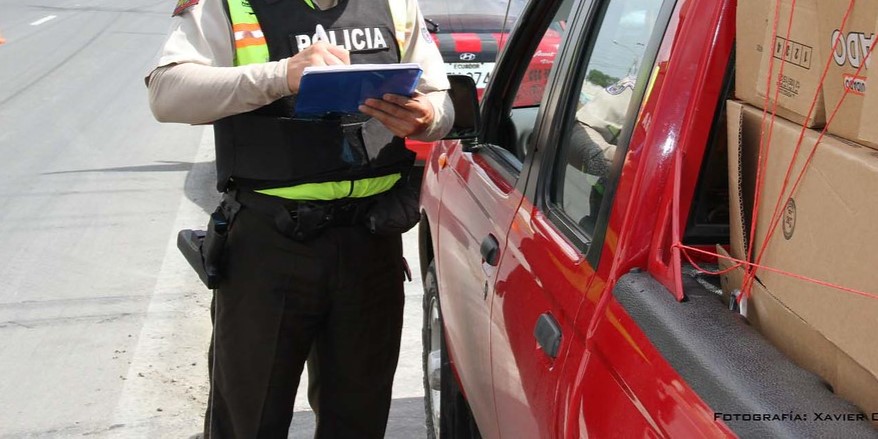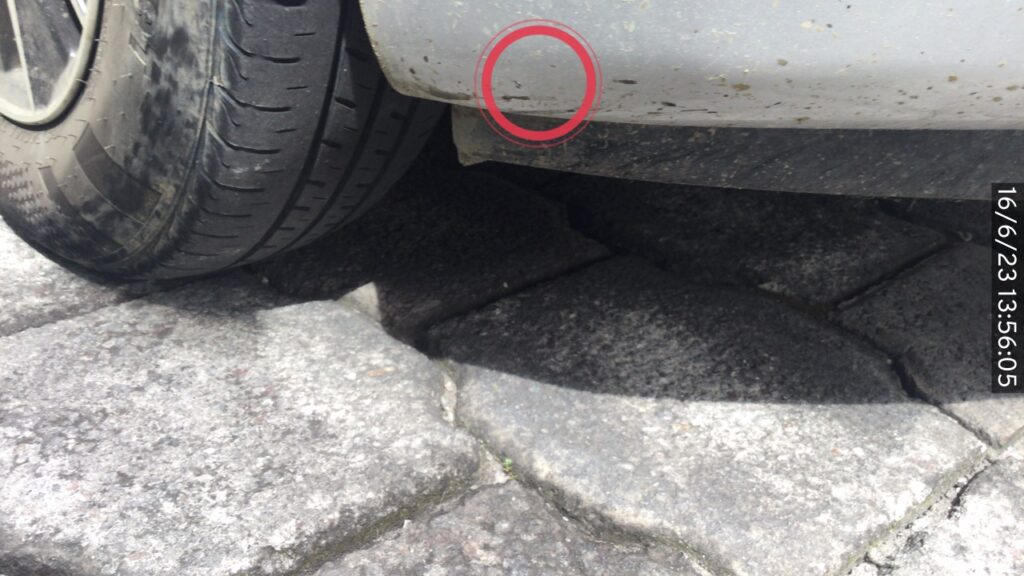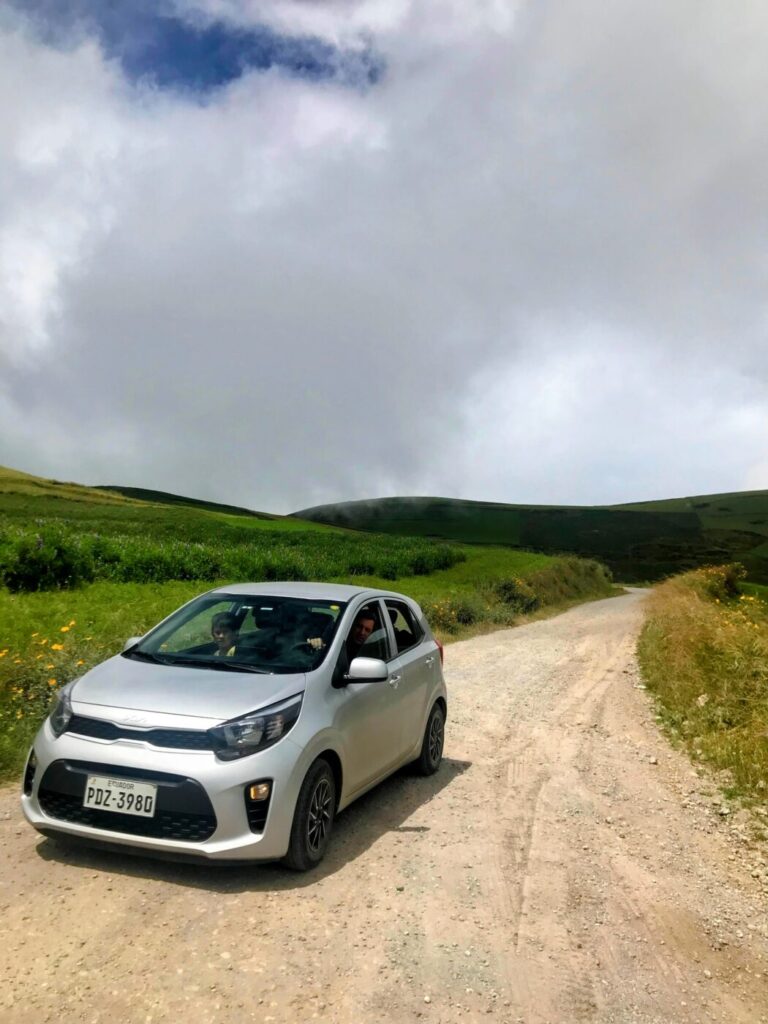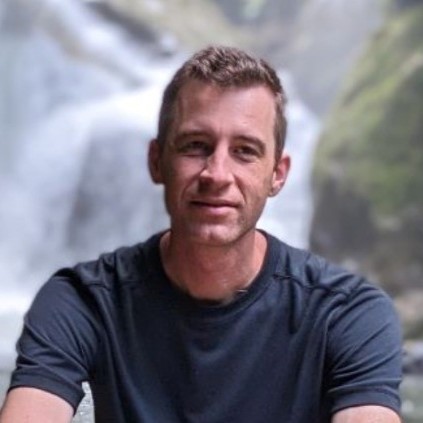How We Escaped a Roadside Extortion Scheme in Ecuador

In the course of a few minutes at a roadside checkpoint between Puerto Cayo and Santo Domingo on the next-to-last day of our three-week road trip in Ecuador, we went from planning to leave the country to contemplating two weeks in a country jail. Because our perspectives were so different, we (Matt, Liuan, and Oliver) take turns telling the story to let you in on what was going through our minds at the moment. Unless otherwise noted, all conversation takes place in Spanish.
A Routine Checkpoint
Liuan: It looked like a normal roadside traffic checkpoint, something we have gone through many times in Ecuador and other South American countries on our gap year. Several white trucks with official “Comisión de Tránsito” markings were lined on both sides of the road. Officers in dark uniforms and bright yellow vests looked into the stopped cars. We compliantly pulled off behind them. Matt readied his drivers license and I pulled the rental car registration documents out of the glove compartment.
Matt: One officer ordered me to straighten out my front tires. The other asked for my passport, which was in a backpack stored in the trunk. He had me get out and retrieve it. The officer followed me to the back of the car and then broke the news: my tire treads were too low and for that reason he would need to detain me. “There’s a problem with my tires?” I asked. I was aware this stop was not going well, but I assumed I must be misunderstanding something. “Show me.”
He led me up front and inserted his device into the groove between my tire treads. The measurement was in the red zone. I’m no mechanic, the treads did seem shallow, but they were the small tires of a compact car. I also thought to myself that he could easily be manipulating the device to show whatever he wanted.
“We’ll need to detain you for 15 days, it’s the law. You’re in Ecuador and you must follow the laws here. If I were in the United States, I would have to follow the laws there.”
“Yeah, but it’s a rental car. We’re going to turn it in tomorrow,” I explained. He replied that it didn’t matter, I was the driver and therefore 100% responsible.
The prospect of going to prison over tire treads seemed to strain credibility. You would think I’d be panicking by now, but in my gut I knew this was a scam and that eventually a dollar amount would be named. I just hoped that it would be a “reasonable” amount. I didn’t dare ask, though. These were still police officers and I was not about to dig myself a deeper grave by offering a bribe.
Oliver: It was hard to understand what the police were talking about, but when my mom got out of the car I knew that something bad might happen.
“I’m hot!” Miles my little brother kept saying.
“I know, Miles. I’m hot too but if you keep whining the police will put you in jail,” I said because I wanted to hear the conversation.
The Price for Our Freedom
L: I stepped out of the car and walked around to the drivers side where Matt and the two officers were standing. The first officer (with the name patch D. Silva) explained again. “Your tire treads are too low. You’ll have to go to with us to Portoviejo to be detained for 15 days while you wait to see a judge.”
The midday equatorial sun glared down and I stared at the hot asphalt as this piece of unpleasant information sunk in. I looked from one officer’s face to the other’s, and then to Matt’s. This had to be a joke. There had to be some way out. I thought about the Zoom meeting I was supposed to be leading at 3 p.m., just a few hours away. I gave that one up for lost and wondered what my colleagues would do without me.
“But we’re returning the rental car tomorrow,” I said. “And we have a flight out of the country in three days. We will lose all our reservations if we have to stay in Ecuador. And we’re not Ecuadorian citizens. Does this really apply to foreigners too?”
“It’s the process. Foreigners are under the same laws of the country and will be treated the same way,” the officer replied. “You’ll have to wait your turn to see the judge. It could be a few days or it could be up to 15 days. The female judges are the harshest. They make you pay up. The male judges, they can be more lenient.”
It came to my mind, then, that we could probably pay our way out. That’s probably what they wanted.
M: My mind was churning through the options. I considered getting in the car and just driving away. But that meant the possibility of getting into a police chase with three kids in the back seat. We had to continue to negotiate, stall, argue — but we had to watch ourselves lest matters escalate. I couldn’t think of what to say next. I was glad Liuan was there. She always knows what to say.
L: “Well, what is the fine?” I asked. This is the question they were waiting for.
“It’s two minimum salaries.” (As if we were supposed to know what that means.) And that is… “$450 each salary, so, $900.”
My eyes went wide. For low tire treads?! This was not even a thing in the United States. It seemed ridiculous to me, even then. In retrospect I realize how incredibly outrageous this amount was. Even our most egregious traffic infractions in the most anal of cities in the United States, like parking in the handicap zone in Oak Park, Illinois, had only every totaled $250. How was this possible?
The officer looked me in the eye. “Look, I can see you are good people, you have good hearts. So I’m going to help you out. You can pay the fine right here and go ahead and leave.”
Somehow, by now, the other police trucks and stopped motorists had evaporated. It was just us and three police officers, two standing next to us and one in the truck across the street facing in opposite direction. We weren’t going to get out of here, I realized, without sacrificing some cash.
I thought about how much we had on hand. “But we don’t even have $900,” I said. “We only have…maybe $600 in cash.”
M: In my mind’s eye, my palm slapped my face. We didn’t have $600. We had $600 two days ago when we pulled cash from the ATM. but then we paid for the hotel in Puerto Cayo and several meals. “No, we only have maybe $400,” I corrected. But the officers liked Liuan’s initial “offer” better.
L: “Let me call my supervisor and see if we can get the amount reduced,” the officer said. He pulled his phone out and placed a call. The person on the other line picked up almost immediately. He asked them permission to reduce the fine. The whole conversation took about 30 seconds. At one point, the officer turned his back to me, revealing the corner of his phone screen under his ear. The phone still displayed the home screen. It was a fake call.
Somehow, this realization made the danger of our situation come into sharp focus for me. My husband, three little boys, and I were stopped on a deserted road in middle-of-nowhere Ecuador with three men demanding money from us. Were they actually police? Were they cons masquerading as police? To what lengths would they go to get what they wanted from us? The blood rushed to my ears. I didn’t even hear what the officer said when he “hung up” the phone.
M: The officer got off the phone and told us they could reduce the fine to $600. If there was any doubt before, now I knew for sure. This was a hold up. If they could reduce the fine that easily, then they could just as easily let us go with a warning. Or just write us a frigging ticket, for God’s sake!

Jail or Bribe
L: Knowing that the infraction and fine were made up, and possibly even the police role itself, my mind raced for an out. I thought about calling them out — the fake phone call, the fake jail threat, the fake fine. But what if that made them angry and turn violent? I pictured them pushing Matt around. Bile formed in my throat. Direct confrontation didn’t seem like the best way to worm out of this one. I latched onto this: if we said we would follow them to Portoviejo, maybe we could then turn off on some road and get away.
“Okay,” I said. “Let’s just go to Portoviejo. We want to do everything by the books, see the judge, pay whatever fine they decide. We just want to follow the rules.”
M: My first reaction: Wait, what? Liuan would rather me go to jail than pay $600? But then I recognized it for the genius move it was. The ultimate stall, call their bluff.
They were not going to take me to prison. If they did, it would make news. American Tourist Goes to Jail in Ecuador For Driving Rental Car With Worn Tires, reads the chyron on CNN. If that was really the law in Ecuador, it would change soon if they cared at all about tourism. Meanwhile, this new twist gave me more time to think.
L: The officer registered surprise on his face. This wasn’t the direction they were working toward. He backtracked. “Well, you know that would take up to 15 days, and you have your flight coming up when?” We told him again, and he counted on his fingers. “Yeah, you would miss your flight.”
M: Of course, there was now a small possibility I really was going to jail. After all, that’s what we said we wanted. So I started poring over the logistics.
Our plane tickets to Costa Rica were non-refundable and a lost cause — would our travel insurance cover the loss? We probably still had time to cancel some of our Airbnb stays in Costa Rica for a refund. Crap, the rental car. There’s no way we’ll be able to turn that in tomorrow. We should at least call them to let them know. Oooh, yes, we need to call them immediately!
The benefits of calling them were immediately apparent. Yes, it was the proper thing to do. But it would also bring a local third-party into this quagmire. Maybe they could advise us on what to do or help us in some other way.
We were back in the car at this point and I ordered Liuan in English, “Call Europcar, now.”
The Police Intensify Their Tactics
L: I have no recollection of how this happened, but I somehow made my way from standing by the driver’s door to back in the passenger’s seat, holding my phone and trying to place a call to Europcar Quito, our rental car agency.
Just a couple weeks ago we had bought a cheap Ecuadorian phone when my Google Pixel conked out. It had a local SIM card with data, but in the past few days it had been inconsistent in providing internet. I had no idea if I would be able to place a Whatsapp call out. I sat in the car staring at the phone, my hands shaking. How are we going to get out of this? What will they do to us? My mind, like my hands, couldn’t hold still enough to make the call. At least a minute passed.
Meanwhile, the officer stuck his head into the driver’s window. “If you come with us to Portoviejo, he’ll have to go in the truck,” he said, pointing to Matt.
Fear gripped my stomach. No way in hell, I thought. Who knows where they would take him. “I can’t drive,” I objected. It was true. I don’t know how to drive a stick shift.
“I’m going to drive this car,” the officer said.
A strange man driving me and my children to somewhere in Ecuador? ABSOLUTELY NO WAY IN HELL. This is when I stopped complying.
“No.” I shook my head vehemently at him from the passengers seat. “I don’t feel safe with that. You’ll have to send someone else to take us. Somebody who is official.”
The officer guffawed. “That’s what we are!” He pointed at his vest and his patch with the name “D. Silva” embossed on it.
I kept trying to work the phone, finally pulling up the rental agency number.
“Come on, get on with it,” he barked through the driver’s window. “Are you going to make me wait here all day?”
“Yes,” I hissed back. “Wait here all day. He’s not getting in the car with you, and you’re not getting in this car. You can take our documents if you want ahead of us. We’ll follow you.”
M: Good countermove by the cops: split us up.
Back in my younger days, working at a summer camp, I used to engage in informal wrestling matches with a guy who reliably dominated me every time. After several matches, it dawned on me that he always won with a chokehold. The next match I single-mindedly made sure he didn’t get an arm around my head and won every single match after that.
Splitting us up was their chokehold.
Up until now, Liuan was the belligerent one, and I had remained compliant and mostly silent. The two cops were on my side of the car. One leaned into the other’s ear to whisper a quick word of strategy. He said something to the effect of, talk to him. In other words, I would be easier to manipulate at this point than Liuan, who had dug in her heels.
The cop put his hand on my arm and gently coaxed me to come with him. Risky as it was, I did something I never thought I would ever have to do, disobey the cops. I pulled away my arm and told him to wait a moment. I was not doing anything until we made this call.
L: Finally, I managed to hit the green call button. The phone rang. Thank God. After a couple rings, a woman answered. Thank you, Jesus. The officer had made his way around to my side of the car. I put the phone on speaker, wanting him to hear if the agent called his bluff.
I started to explain to the woman our location and predicament. The officer started trying to talk over me into the phone. She asked if he would give his phone number so they could talk directly. He pretended to be confused, “What phone number?” It came to me then that he was loathe to give out anything that might identify him. I wondered if the name patch on his vest was his real name.
“Here, let me just talk to her,” the officer said. He grabbed the phone out of my hands and walked away from the car. I got out and followed, wanting to catch every word and not let him pretend the agent said something she didn’t.
“I’m Abogado Silva.” [Abogado: Lawyer] He went onto describe our infraction and fine.
They went back and forth, she telling him he couldn’t detain foreigners. He saying that was the procedure and that they had to follow procedure. At some point, again I’m not sure how, the phone was back in my hands and she told me to ask for his identification.
“You’re not a lawyer!” I accused. “Where is your identification?”
He looked at me as if my request were outrageous. Again, he pointed at the name, D. Silva, embossed on his vest. “I’m the police. You can see that!”
It struck me, again, how precarious our situation was. How far could we resist? Could we just drive away? I looked at Matt’s drivers license and the car registration documents in the officer’s hand. I reached out to grab them. He turned away, blocking me.
Into the phone, I said, “Señora, please, send help. I don’t know who these men are and what they are going to do. Please, call the police.” Every hair on my neck stood on end and I could barely breathe.
The woman in the phone switched to English. “Lady, lady, listen to me.” Her voice was tinged with alarm. “Go back to the car. Lock the door. Don’t let them get in.” I did as she said.
“Please, call the for help,” I pleaded.
“Yes, yes.” She hung up.
A Hurried Exit
M: We both scurried back into car. I wanted to lock the doors and roll up the windows but there wasn’t enough time.
L: I looked up. The officer was at Matt’s window. “The police are coming,” I said.
M: I braced myself to be forcefully ripped out of the car and dragged away. We were so screwed. How awful was this going get? At what point would we say “uncle” and hand over the cash?
L: It happened in a whirl. The officer snapped pictures of the documents and pushed them through the driver’s window. “You will have to pay the fine before leaving the country!” he called. Then he ran across the street into the waiting truck and they sped off in the other direction.
I could barely register what was happening. “Drive away!” I told Matt. “They’re leaving.”
M: They left in a hurry. I immediately knew it was over as suddenly as it began. Liuan wanted me to race off, but I hesitated as I watched their pickup truck recede in the distance and then disappear around a bend. Could I just leave the scene like that? Weren’t other police coming? Would I be intercepted down the road if I drove away? But then again, sitting there seemed pointless. It was surreal to be able to just continue on.
O: We turned a curve and I looked back behind us. Nobody was following for the rest of the time we were driving. I kept looking back and thinking how bad that could of been.
L: I didn’t look back to see if they had turned around and were following us. Matt suggested that we should probably call the rental agency to let them know we had left the scene. Just in case they had actually called the police, whoever those other police might be. We stopped so I could place the call. “They were just thieves trying to get your money,” the woman said. “The important thing is that you got away. Thank God you got away safely.”
We kept driving. I turned around to look at the kids. They had been quiet and sweltering in the backseat this whole time. Oliver’s face was red, his eyes watery. He looked like he was about to burst into tears. Finley looked withdrawn and serious. Miles said he was hungry. I reached back to touch each of their legs. We had escaped. We were alive. We were still on the road, going to Santo Domingo. About 45 minutes had passed since we had stopped at the checkpoint. Forty-five awful, fear-drenched, sour-sweat-dripping minutes.
For the next hour, my chest continued to feel tight and painful. It was past lunchtime, and there was a pit in my stomach. I couldn’t tell if it was hunger or the dregs of our ordeal. Miraculously, we even made it to the hotel just in time for my 3 p.m. Zoom meeting.
Three Days Later
L: I’m writing this account three days after the incident. We’re on a plane leaving Ecuador. We’re not detained in Porto Viejo waiting to see a judge, not driving around in God knows what remote part of the country with unknown men. I cannot believe we escaped that situation unscathed, not even handing over a dollar. Matt and I have debated whether the men were corrupt police or cons. There is still a question in my mind, but we have certainly heard of corrupt police from the locals we have told the story to. Attempted money extraction and threats of detainment by police is also described as one of the hazards of travel to Ecuador on the Canadian government’s webpage.
M: They were definitely real cops. Police checkpoints are routine in every South American country we visited. There were too many people involved at this checkpoint, including two more police vehicles and three other stopped vehicles. The setup was way too elaborate for it to be anything but real, especially considering how mediocre they were at being con artists.
The rental car agent told us later never to stop on the highway. But I would not advise blowing through a police checkpoint unless they motion for you to continue on. In this instance, the cop was standing directly in the road signing for us to pull over. I’m not going to nearly run over a cop, even to avoid another nasty experience in the future.
To my eternal regret, we didn’t take any pictures or video. We didn’t even think to put a pin on the map before we drove off. In the end, we didn’t end up filing a police report. There was very little time left to do it and we had almost no evidence or identifying information. I still thought we should, but the rental car agent told us it was a pointless gesture. Without external pressure, and the scant information we could provide, how likely was it that the national police would take action? Not very.

Beware Driving E38 Between Manta and Santo Domingo
M: In one sense, I hate having to write a story like this. For most of our six weeks in the country, Ecuador impressed us with its modern highways built through extreme terrain, its relative safety, its great tourism infrastructure and its many natural wonders. Then something like this happens, as confirmation to those who think everywhere outside the U.S. is wild territory. I don’t think this is true, but I also have to be honest with readers, especially for those might use this information and avoid a tense or dangerous situation.
While we didn’t pinpoint our location in the moment, we were able to triangulate or approximate location using the time stamps of our phone calls to the rental agency. I would highly advise avoiding this stretch of highway. I’m sure this wasn’t the first or last time these particular transit police have conned and extorted motorists.
The following map shows where we are pretty confident the incident occurred. It is a stretch of highway in the coastal region of Ecuador, E38, between the towns of Tosagua and Chone. I should also note, every Ecuadorian (and expat) warned us about the coastal region — mucha delinquencia, was the refrain.
The cops wouldn’t show their IDs, for obvious reasons, but the patch on one of their vests said D. Silva.
In the unlikely event that you are reading this and know who this is and have the power to do so, put some eyes on this guy. For everyone else, steer clear.







Liuan y Mateo y los niños cuanta pena me da que hayan tenido esta experiencia tan fea en mi pais que tanto quiero. La verdad que es triste que haya gente asi, que hace todo lo contrario a lo que es su deber. Lo bueno es que ya estaban al final de su visita porque me imagino que hubiera sido mas dificil disfrutar si esto hubiera pasado antes. Me ha gustado mucho ver sus fotos y leer de sus experiencias durante este año. Me parece que ha sido una experiencia increible y de mucho aprendizaje. Dejennos saber cuando regresan. Nos encantaria escuchar mas de su gran aventura. Bendiciones!
I have a response to this I feel should be sent to whatever group this appeared in.
On a trip about 2 years ago, returning from Vilcabamba to the Quito area in my personal car with my dogs, I was stopped at a checkpoint and informed by a police officer that my dogs were supposed to be secured and not loose in the car and that there was a fine. I denied there was any such infraction as I’ve never seen any mention of it in any of the driving tests I’ve studied for. I requested a citation for where the requirement existed in the law and was immediately told it wasn’t his job to provide that information. He wanted, I think, $30, eventually reducing it to 10. I wasn’t buying it. Eventually, I thought he said there wouldn’t be any fine and I was free to go. I drove ahead and pulled off the road, and getting out with my pen and notepad, returned to the officer and questioned him some more recording his name and other info. I think at that point I wasn’t quite sure if this was for real or not, but after that I returned to my car and continued my way, never receiving any communication about any such infraction.
Of course my experience was not nearly as stressful as the story above relates, but it’s understandable why. We gringos, from the USA, are taught that the police are the ultimate enforcers of the law, that they must always be obeyed and that they come with the full might of the government behind them, and offering to bribe a police officer is about the worst thing one could do in the USA. Combine that conditioning with corrupt Ecuadorian police officers and you get a very toxic situation as described by this family.
Traveling in any foreign country requires one understand the customs and culture of that country and that includes how to handle corrupt police. While this was very frightening, and admittedly worse than my experience (noted by the suggestion that the family would be driven somewhere against their will) the danger was likely not as much as perceived, as noted by the police, presumably armed, could have carried out a mass kidnapping but they did not, choosing instead to flee.
Corrupt police can be challenged and bargained with. These police would likely have accepted $10 each if a sympathetic pitch and/or adequate challenges as to the infraction were attached. Those somewhat acclimated to the culture would probably have understood this intuitively and not been fearful, but again, those with gringo conditioning as to how to deal with American police would not understand and would be enormously more stressed. Of course these police recognized they were dealing with “rich gringos” and cited an extreme fine hoping it would be seen as quite affordable.
Overall, it seems this family did well in how they handled the situation. But I think with better understanding of the nature of this type of corruption and how to handle it, they probably could have avoided reaching the threat of being driven somewhere which is understandably very scary. Perhaps paying $30 and an otherwise amicable parting with these corrupt officers would have been preferable to driving in exhaustive fear for the remainder of their trip, which is something to consider and debate.
I appreciate their sharing their story.